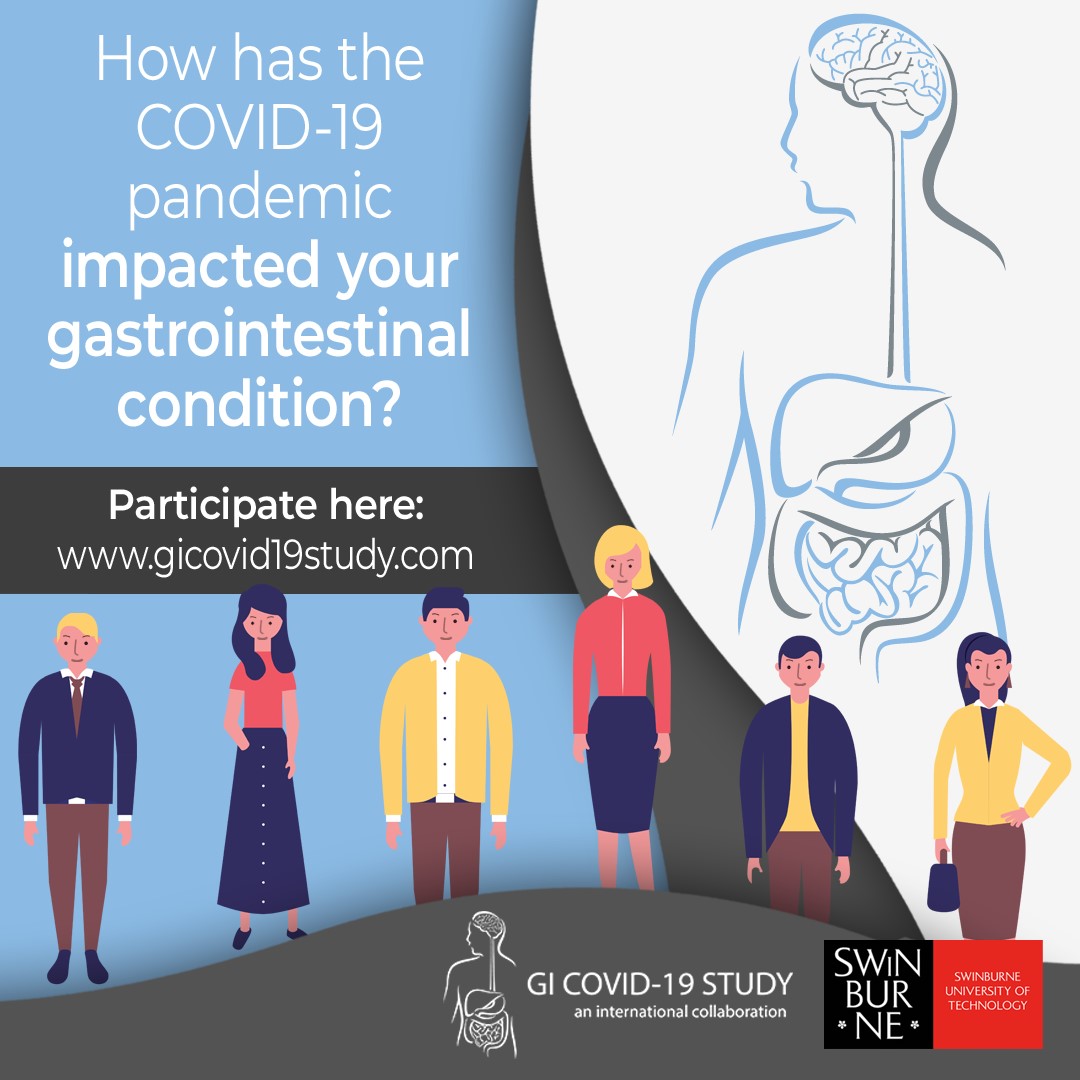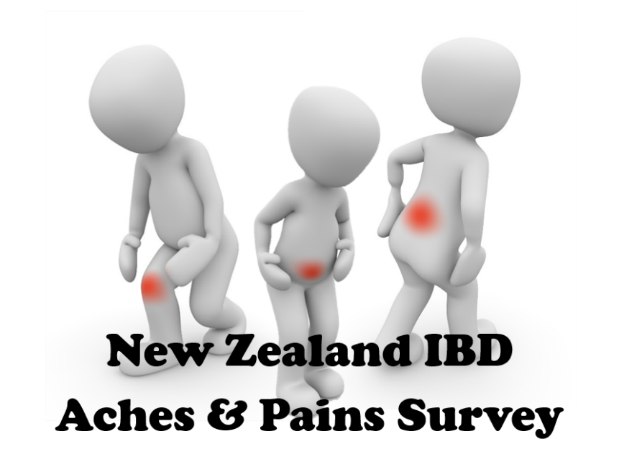CURRENT RESEARCH
Researchers based in Australia are collaborating with others from around the world to evaluate the effects of COVID-19 on gastrointestinal conditions.
The NZ lead is Professor Richard Gearry from the University of Otago.
The study has received ethical approval from the University of Otago and Swinburne University. An information sheet concerning the research is attached. http://www.gicovid19study.com
http://www.gicovid19study.com
This questionnaire is different to the one recently sent out by CCNZ. It is a longer questionnaire and participants are asked to complete it on two occasions. It also includes people with other gut diseases.
The coronavirus (COVID-19) pandemic has had a pervasive impact on human society, with many countries around the world implementing self-isolation procedures in order to reduce the spread of the virus and pressure on healthcare services. For around 1 in 5 individuals living with a gastrointestinal condition, the pandemic may have greater impact due to the challenges with accessing medications, seeing health professionals, and attaining basic necessities such as foods associated with specific dietary requirements and even access to toilet paper.
An international consortium of researchers, led by Dr Simon Knowles, Swinburne Researcher and Clinical Psychologist, are exploring the perceived impact of the COVID19 pandemic on gastrointestinal symptoms, gastrointestinal condition management, fears relating to COVID-19 and psychological distress. The findings of this study will help us better understand the impact of the COVID-19 pandemic on those living with a gastrointestinal condition.
The researchers are looking for participants who are at least 18 years of age, diagnosed any type of gastrointestinal condition, and able to read English. Please only complete an online survey.
If interested, please visit the study website: www.gicovid19study.com
Attitudes towards COVID-19 in Inflammatory Bowel disease
Professor Michael Schultz and Dr Jack Ye.
We would like to extend an invite to you to participate in this survey to help us understand how the recent COVID-19 pandemic has affected you. You have received this invite due to your diagnosis of Inflammatory Bowel Disease. This survey can be completed via the link below or the QR code below and should take no more than 15 minutes to complete. The survey is anonymous and no identifiable personal information will be recorded.
This survey has been approved by the University of Otago Human Ethics Committee (#HE20-005).
We appreciate you taking your time to help us get a better sense of how this recent pandemic has affected you.
Thank you for considering our survey.
Kind regards
Professor Michael Schultz and Dr Jack Ye
May 2020
Click here for survey
Travelling Abroad with IBD 
Barriers to traveling abroad experienced by patients with Crohn’s disease or ulcerative colitis – a nation-wide survey
There are a lot of discomforts associated with Inflammatory Bowel Disease; we recognise these causing important challenges when travelling abroad. A few studies have explored the topic, but currently there are no guidelines regarding travel advice. In this research study, we aim to systemically identify travel habits and related issues you have to deal with in order to devise guidelines that will help IBD health professionals give specific advice regarding safe and easy travel.
If you are at least 18 years old, have been diagnosed with Inflammatory Bowel Disease (IBD), such as Crohn’s disease or ulcerative colitis, and currently live in New Zealand we would like to invite you to take part in this study.
This survey will help us learn more about the challenges you face to ensure the best care and support possible. Participation in this survey is anonymous, voluntary and no money/rewards are offered in exchange.
The questionnaire contains 71 mostly multi-choice questions that should not take longer than 15-20 min.
www.surveymonkey.com/r/TRAVELIBD
If you have any questions, please contact the Principal Investigator A/Prof Dr Michael Schultz
(Email: gastro.trials@southerndhb.govt.nz; Phone: +64 3 474 0999 (ext 58518)
[This project has been reviewed and approved by the Department of Medicine, University of Otago and University of Otago Ethics Committee no. CatB D17/251.]
“Living with Medicines” in New Zealand 
As part of her Honours degree, Charlotte Brenkley, a final-year Pharmacy student at the University of Otago wants to explore New Zealander’s experiences of taking their daily, long-term medicines.
She is looking for people 18 years of age and over who have been taking at least one prescription medicine regularly for at least 3 months for their health conditions.
She would love you to complete the Living with Medicines Questionnaire, a tick-box questionnaire which can be completed in about 10 minutes.
Please click here http://tinyurl.com/LWMweb for links to information on the project and the questionnaire.
New Zealand IBD Aches & Pains Survery
You are invited to participate in an online survey about ongoing pain in people with Inflammatory Bowel Disease
This survey is part of a larger study at the University of Otago, aimed at investigating why individuals with IBD develop persistent pain in order to help find targeted treatments.
Attached to this email is an Information Sheet and Consent Form with details about this study, to include contact details if you have any additional questions.
You must be an adult (18 years or older) to participate. The survey takes approximately 10-15 minutes to complete. At the end of the survey you will be given the opportunity to enter in a prize draw for a $50 Prezzy card! There are 5 chances to win!
Thank you for your time and interest in this study. After reviewing the Information Sheet and Consent Form, you can begin the survey by clicking the link below:

IBD Medication Adherence 
Do you have Crohn's disease or ulcerative colitis? Are you interested in helping with some research?
Maintenance medication adherence rates and beliefs about medication in New Zealand adults with Inflammatory Bowel Disease
The aim of this research study is to explore the adherence to and beliefs about medication in adult IBD patients. This will be compared with overseas studies to see if rates of adherence and beliefs about medicines are similar in a New Zealand population.
This study involves a brief online questionnaire which is anonymous and only needs to be completed once.
You need to be over the age of 18 and have either Ulcerative Colitis or Crohn’s disease. You also need to be on medication for this now, or have been on some in the past.
The survey will take 5 – 10 minutes to complete
http://ibdmedicationadherence.questionpro.com/
It is hoped that by understanding why patients might not take medication, we can provide better information and support, to help keep people with IBD well.
Contact Details: Kirsten Rosser – Researcher - 03 364 1799
This project has been reviewed and approved by the University of Otago Human Ethics Committee, (Health). Reference: H17/047
Middlemore Clinical Trials
At Middlemore Clinical Trials, located at Middlemore Hospital Auckland, we are currently running a drug trial for people living with active (moderate to severe) Crohn’s Disease. If you would like to find out more information about the study, please Contact:
Jessica Purcell lClinical Research Nurse | Middlemore Clinical Trials (Formerly CCRep)
In association with Counties Manukau Health (CMDHB)
Ph +64 (0)9 276-0267 ext 8267| Mob +64 (0)21 483 570 | Fax +64 (0)9 270 9737 | Jessica.Purcell@mmclintrials.nz www.mmclintrials.nz “
Crohn's and Colitis New Zealand Inflammatory Bowel Disease GEM Project

The GEM Project has arrived in New Zealand! GEM stands for Genetics – Environment – Microbiome and is a multi-national study, initiated by Crohn’s Colitis Canada and introduced to CCNZ already several years ago. As medical adviser to CCNZ I saw the merit in such research and after considerable negotiation was able to secure the rights to conduct the study in NZ.
The GEM study aims to recruit healthy First Degree Relatives of patients with Crohn’s disease and to follow them for 6 years. The aim is to find the difference between those who develop Crohn’s disease in this timeframe and those who don’t. FDRs are being asked to complete multiple questionnaires and give a blood, stool and urine sample. Following this, it is just a short phone call every six months for six years or until they develop Crohn’s disease. The relatives should be between 6 and 36 years, so we are looking for children and siblings primarily.
So far, 3500 people have been recruited world-wide of which 40 have developed Crohn’s disease. This study is a monumental effort. Every patient counts. Through CCNZ we hope to obtain the required number of patients and FDR’s
If you are interested, please send your name, date of birth and if you have, NHI number to us in Dunedin (Aroha Bolton; aroha.bolton@southerndhb.govt.nz) or myself; michael.schultz@otago.ac.nz). We will approach you and if you agree talk to your relative. We will then negotiate with your local specialist to be seen there. Please help to give this study a NZ flavor.
 Diagnosed with Crohn’s or Colitis? Research participants wanted!
Diagnosed with Crohn’s or Colitis? Research participants wanted!
We are looking for participants aged 18 years and older with a diagnosis of either Crohn’s disease or Ulcerative Colitis to complete two online questionnaires three months apart.
Each questionnaire will take approximately 20-30 minutes to complete and will ask questions about your mental and physical well-being and the social support you receive from others. Those who complete the 1st questionnaire will go into a draw to win a $150 Westfield voucher. Participants who complete both questionnaires will go into a draw for an Apple IPad mini.
This research is being carried out by Siobhan Hayde, and supervised by Associate Professor Roeline Kuijer of the University of Canterbury, Department of Psychology.
If you are interested in participating or wish to know more please contact,
Siobhan Hayde: siobhan.hayde@pg.canterbury.ac.nz
This research has been approved by the University of Canterbury Human Ethics Committee







 Diagnosed with Crohn’s or Colitis? Research participants wanted!
Diagnosed with Crohn’s or Colitis? Research participants wanted!